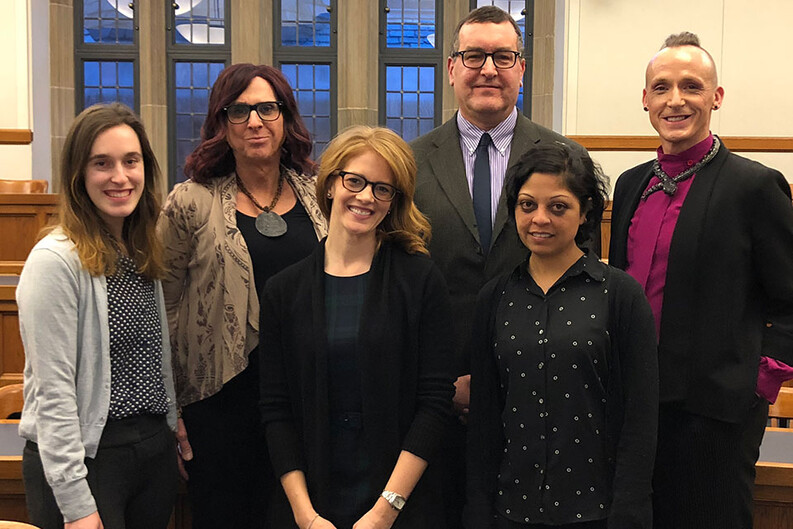Solomon Center Hosts Panel on Challenges in Trans Health

On March 22, 2018 the Solomon Center for Health Law and Policy, New Haven Pride Center, Trans@Yale, Yale School of Medicine Outpatient, Yale Law School OutLaws, and Yale Health Law and Policy Society hosted an interdisciplinary panel entitled “Challenges in Trans Health: Legal Framings, Advocacy, and Barriers to Care.” The discussion was moderated by Solomon Center Executive Director Katie Kraschel.
The panel began with Dr. AC Demidont, Chief Medical Officer at the Anchor Health Initiative, who specializes in transgender medicine. Demidont presented research on health and socioeconomic disparities for transgender Americans, highlighting data about the extremely high rates of attempted suicide among transgender individuals. Demidont also described the violence encountered through participation in underground economy, which is often the only employment option for trans Americans who face high rates of employment discrimination. She shared additional data on the high rates of discrimination and harassment in health care settings, which discourages trans patients from seeking care in the future. Demidont concluded with Connecticut-specific challenges to accessing hormone therapy and surgeons who will provide transition-related procedures, emphasizing that even in a comparatively trans-friendly state, the hurdles to adequate care and equity remain enormous.
Sean Cahill, Director of Health Policy Research at the Fenway Institute, focused his presentation on discrimination in public accommodations. Transgender Americans face high rates of discrimination in public accommodations, but Cahill noted there is no federal law that explicitly protects trans people in public accommodations, and the current Department of Justice has interpreted federal sex discrimination protections to exclude discrimination on the basis of gender identity or sexual orientation. Cahill also identified provider refusals as an emerging threat to trans health with both federal and state governments pushing legislative and administrative proposals that could protect providers who refuse to provide care to trans patients for reasons of “conscience.”
Pooja Gehi, Executive Director of the National Lawyer’s Guild, then described her experience advocating for Medicaid coverage of transition related care in New York when she worked for the Sylvia Rivera Law Project, a collective that serves low-income people and people of color who are transgender, intersex, or gender non-conforming. She discussed the challenges of working within the state government, including the initial dismissal of her case against New York Medicaid. She credited the eventual success of her advocacy for coverage to less traditional tactics, including jamming fax machines and disrupting public events.
The presentations concluded with Andee Scallion, who is a member of the Connecticut Stonewall Speakers bureau. Scallion shared the challenges she has faced as a trans woman in the health care setting and beyond. She described her struggles to obtain insurance that would cover transition-related care only to learn that the providers who perform the needed procedures would not accept this insurance. Scallion also explained that negative experiences in health facilities are often connected to front-office staff who repeatedly mis-gender her even after the arduous and expensive process of changing all of her identification and medical records to reflect her gender identity. She closed with her concerns about aging and how medical professionals will treat her when she is at her most vulnerable.
Questions from the audience focused on the potential for advance directives and the Older Americans Act to ensure elderly trans people do not face discrimination as they age. Reflecting on recent court decisions identifying discrimination based on sexual orientation as a form of sex discrimination, Gehi acknowledged the problems with using sex discrimination under Title VII rather than focusing on gender identity itself but stressed that Title VII sex discrimination can be a critical vehicle to redress discrimination against trans and gender nonconforming people.


